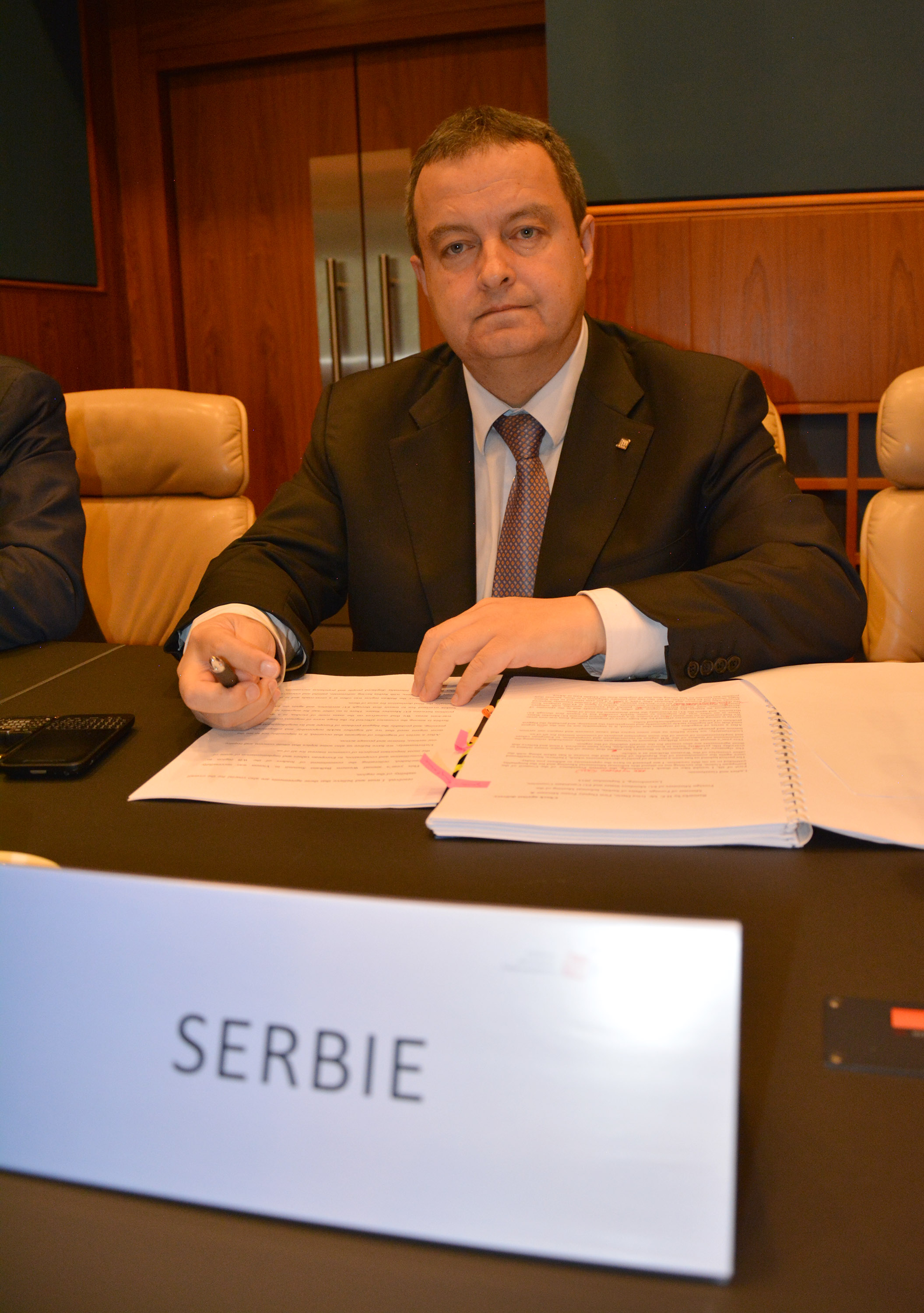



| Saturday, 05 September 2015. | |
| MFA Dacic holds a number of bilateral meetings in Luxembourg | |
| + larger fontnormal font- Smaller font |
 Minister of Foreign Affairs of the Republic of Serbia Ivica Dacic is on a two-day visit to Luxemburg, where he participates in an Informal Meeting of the Foreign Ministers of the European Union. On the sidelines of the meeting, Minister Dacic had a series of bilateral meetings. Minister of Foreign Affairs of the Republic of Serbia Ivica Dacic is on a two-day visit to Luxemburg, where he participates in an Informal Meeting of the Foreign Ministers of the European Union. On the sidelines of the meeting, Minister Dacic had a series of bilateral meetings.“The agenda of today’s meeting of the Foreign Affairs Council, which was also attended by the Foreign Ministers of the EU candidate countries, was devoted to the issue of migrants. When it comes to this subject, I presented the latest information that we have: that 120, 000 people have crossed the state border of Serbia so far, that about 108, 000 persons said they intended to seek asylum in our country, and that only 500 people formally applied for asylum, which shows that they do not really want to stay in our country. We discussed the measures taken individually by some countries - some have announced further radicalization of these measures, such as Hungary, and Macedonia is also considering what to do if the migratory wave of the crisis is intensified. Nothing new was heard when it comes to the actions of the European Union, except that in the coming weeks of the next month, another conference will be convened, its venue is yet to be determined - whether it will take place in Hungary or in some other country, and will address issues of the migratory crisis. When it comes to money, there was not any major progress. So far, EUR1.7 million was allocated to our country, together with Macedonia, and Commissioner Hahn spoke of some EUR1.8 million allocated for the entire region, including Turkey. So, I have to say that this is another meeting at which Europe is seeking a common Action Plan to address the issue. On the other hand, I took this opportunity for a series of bilateral meetings that concern our foreign policy position. I spoke with Minister of Foreign Affairs of Slovakia Miroslav Lajcak and Romania Bogdan Aurescu because it is very important to have regular contacts with them due to our problems, such as the issue of Kosovo and Metohija. I talked with Hungarian Foreign Minister Peter Szijjarto, who informed me about their next moves and actions. I expect that already on 9 September, the Chairman of FAC, Luxembourg Minister Asselborn, who will be a guest of our country, will be in Belgrade and talk with our top officials. He will come at my invitation and we will talk about the problem of migration as well, and therefore I expect in the coming period that we will have some outlines of a solution that the European Union will be able to define as its common policy. Also, although it was not an issue, in my address I underlined once again that we thought it was time now rather than next year, to open negotiating chapters, because Serbia has done everything that was required. Federica Mogherini was fair and after my speech said that everything done by Serbia was a very important signal and hoped it would be a signal for the entire region, and we certainly hope that Commissioner Hahn and High Representative Mogherini will propose the opening of chapters by the end of the year. We believe that Serbia deserved it and that it would be very important for the further European integration. Nobody from the European Union asked Serbia for suggestions of how to solve the migration crisis. They are simply lagging behind the problems. Some discussions forced me to think that perhaps not all the countries are aware of this problem. Some Ministers spoke about the smuggling of migrants. That was may have been an issue two or five years ago. We are talking about mass exodus, not about smuggling. I want to say that a big organization like the European Union must be able to react quickly to certain problems occurring in life. Serbia has been presented as a positive example with regard to migrants. Last time I spoke about it, I was perhaps too harsh. We are of course grateful for EUR1.7 million, which we received together with Macedonia from the European Union, but I think it is too little to solve this serious problem”, said Minister Dacic. |